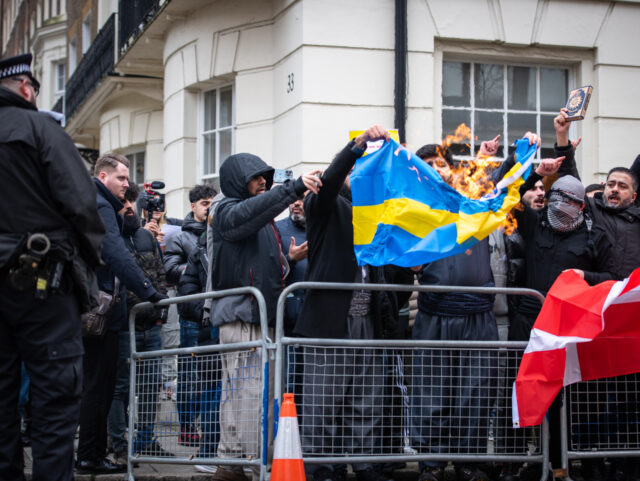The Russian government’s embassy in Denmark has condemned protests in the Scandinavian country that saw the Qur’an burned, declaring the “mockery” of Islam should not be covered by the freedom of expression.
“On January 27, in Copenhagen, including in front of the building of the Consular Section of the Russian Embassy in Denmark, a series of blasphemous actions took place to burn the Koran, a book sacred to Muslims,” the Russian embassy said of recent demonstrations organised by the controversial Danish-Swedish anti-Islamisation activist Rasmus Paludan.
“Public mockery of the feelings of believers, organized with the connivance of the Danish authorities, is not a manifestation of freedom of speech and democracy, but a rude and ignorant provocation, calculated to incite inter-religious hatred and inter-civilizational conflict,” the embassy added in its Telegram statement, which was also linked on Twitter, demanding that such demonstration be banned and their organisers “held accountable”.
President Vladimir Putin has himself made similar comments about the inviolability of Muslims’ religious feelings, perhaps most notably in his 2021 end-of-year press conference.
“If there is an insult against Prophet Muhammed do you think this is about exercising your freedom of creativity? I don’t think so,” he told reporters.
“I think it’s an infringement of the freedom of religion. This is also an insult to the sacred feelings of people who profess Islam,” he said, emphasising that Russia is a “multi-ethnic, multi-religious” state and suggesting that improper use of freedom of expression provoked incidents such as the radical Islamic terrorist attack on the offices of Charlie Hebdo in France.
While the Russian government is viewed by some as a bastion of European and especially Christian conservative identity, Putin has advanced a different vision of the sprawling federation, at least rhetorically, as a “multinational state” and “multi-confessional” state — partly to build support in Muslim-majority areas of the country, such as Chechnya and Dagestan, and partly to build up relations with countries in Africa and Asia not firmly aligned with the West.
He has also leaned into woke narratives on the supposed origins of the West’s relative wealth and power, alleging that “[t]o a great extent, the level of prosperity that has been achieved in former colonial powers is grounded in the robbery of Africa,” for example.
Reuters estimates that Muslims account for around 15 per cent of the Russian population — significantly higher than in Western European states that actively promote multiculturalism, such as Britain, France, and Germany — and the Kremlin has in recent years encouraged large-scale migration from chiefly Islamic countries in Central Asia to fill gaps in the workforce.
Late last year, migrants were offered a fast track to Russian citizenship in exchange for one year of military service.

COMMENTS
Please let us know if you're having issues with commenting.